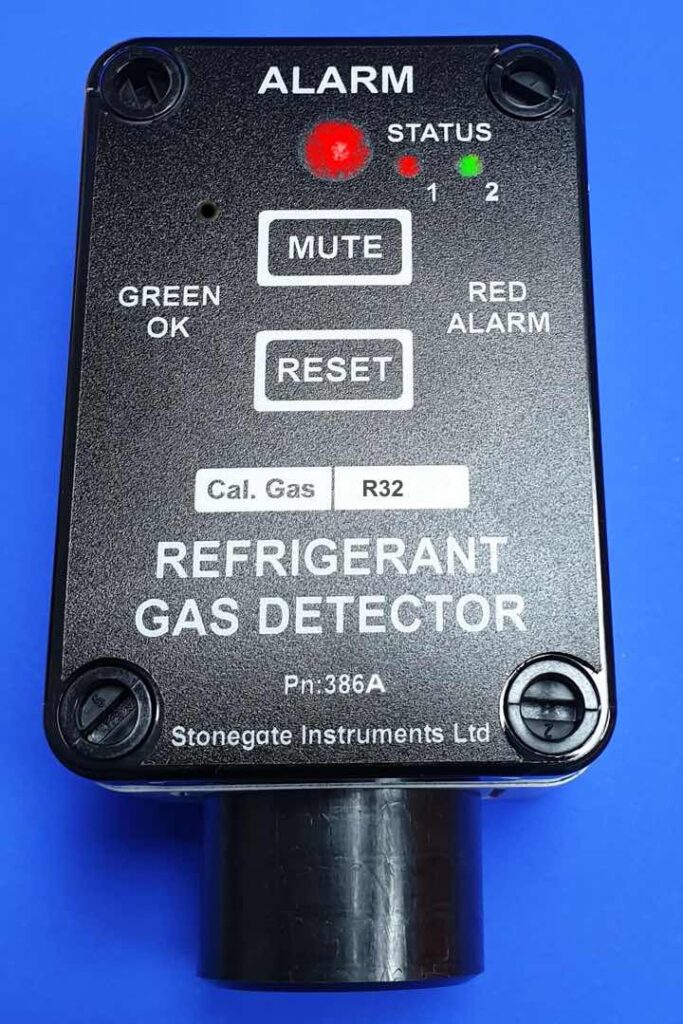Cold stores are an inherently high-risk environment. Shaun Evers, managing director of Stonegate Instruments, highlights how smart technology can help minimise these risks.
Leeds, UK: “While many of the risks in cold stores stem from exposure to cold temperatures, the refrigeration systems in these spaces can pose additional risks if a gas leak occurs.
Cold stores are a key link in modern industrial processes and are essential in terms of the safety, hygiene and competitiveness of many operations. Although the top priority when managing a cold store is usually to keep goods within the required temperature range to avoid spoilage, it is equally vital to protect workers from hazards such as exposure to cold, entrapment, and slips, trips and falls. Unfortunately, one area that is often overlooked from a health and safety perspective is the detection of refrigerant gas leaks.
Detecting such leaks has a triple goal – protecting people and facilities from the dangers posed by exposure to refrigerant gases; ensuring the efficient operation of equipment to reduce operating costs; and preventing damage to the environment.
Harmful effects of gas leaks
Refrigerant gas leaks are the foremost contributor to energy loss in modern refrigeration and heating, ventilation, and air conditioning (HVAC) systems. When a leak occurs, these systems become inefficient and needs to work harder to maintain capacity. This directly translates to increased energy and operating costs.
Additionally, if coolant leaks from a system, it can rapidly evaporate into a lethal gas which can cause cause breathing difficulties, coughing, nausea and vomiting, skin and eye irritation, and headaches. In severe cases, it can even result in asphyxiation.

Of course, as gas gets released into the atmosphere, it also has an environmental impact as it causes ozone depletion and contributes to global warming.
Technology to the rescue
Detecting a gas leak can be challenging as refrigerant gas is both odourless and colourless. In fact, it is estimated that 60% of gas escapes before anyone notices. While there are a several things that can be done in the case of a suspected leak, nothing can replace the accuracy and efficiency of using specially designed technology for this task. Whether a leak results from mechanical damage, equipment failure or poor maintenance, a gas detection system can help prevent a minor incident from becoming a crisis.
Designers and manufacturers of electronic equipment for the refrigeration and HVAC industries have worked diligently over the past few years to improve the effectiveness of refrigerant, toxic and combustible gas sensors, with modern sensors boasting greater intelligence and capabilities to combat risks posed by toxic and non-toxic gases.
Thanks to rapidly evolving technology, the latest generation of sensors and systems are smart, self-contained single fixed gas sensors which are particularly suited to detecting gases associated with refrigeration and HVAC units. Many of these sensors have a proven return on investment of just two years, and that is without taking into consideration the cost of repairs to an existing faulty system.
Smart sensor equipment with signalling alarms, LED lights that indicate the presence and status of each sensor, as well as audio/visual alarms to alert staff, is also available. These systems help ensure that leaks are quickly identified and repaired at the first opportunity, minimising the various associated risks.

However, the latest technologies don’t just help with gas leaks, but also with the detrimental effects of poor temperature control. Smart thermometers and temperature displays enable the monitoring and optimisation of refrigeration systems so that they function at the optimal temperature for the specific items they store. Should any temperature anomalies occur, the system will alert staff so that spoilage can be prevented. Open door alarms offer similar benefits.
A look at regulations
National and international guidelines regulate the use of refrigerant gases and aim to control and reduce their environmental impact. As such, an understanding of F-Gas regulations – established in 2020 as part of a policy to combat climate change – is vital for anyone working with refrigerant gas.
Under UK and EU legislation, a ban has been in force that prevents refrigerants with a Global Warming Potential (GWP) greater than 2,500 being used to service or refill refrigeration systems, with a refrigerant charge size of 40 tonnes of CO2 equivalent or more. In addition, the topping up with new fluid of systems that use some HFC refrigerant gases, such as R404a and R507a, has been banned.
The regulations stipulate that equipment must be fitted with a leak detection system if it contains F-Gas equivalent to 500 tonnes of CO2. They have also raised the requirements for regular gas leak checks: leakage checks should be carried out at least once every 12 months if the system contains F-gases in quantities of 5 tonnes of CO2 equivalent or more, at least once every 6 months if it contains F-gases in quantities of 50 tonnes of CO2 equivalent or more, and at least once every 3 months if the system contains F-gases in quantities of 500 tonnes of CO2 equivalent or more.
Additionally, to prevent the risk of ignition posed by the flammability of some refrigerants, operators are required to maintain in-room concentration levels below the lower flammability level. This requirement is reinforced by safety legislation and standards such as ISO 5149 and EN 378.
In line with F-Gas regulations, the Environment Agency has the power to impose civil penalties of up to £200,000 for various breaches, including failure to comply with provisions in the regulations or permitting another person to breach those provisions.
While F-Gas regulations have been in force since January 2020, the European Commission published a proposal for a major revision thereof in April this year. Following review, it is expected that it will be agreed during 2023 and come into force in January 2024. The UK is conducting its own review of the proposal, with UK implementation expected to occur in 2024 or 2025.
Refrigerant gas leaks pose several threats – to workers, the environment, and the bottom line. However, managed in a controlled environment and coupled with the use of modern safety and monitoring technology, these gases will operate at their most efficient level, thus mitigating these risks.
About Stonegate Instruments
Stonegate Instruments designs and makes electronic equipment for the refrigeration industry. For more information about the latest technology available, contact Stonegate Instruments on 0113 224 4440, or email sales@stonegate-instruments.co.uk.





